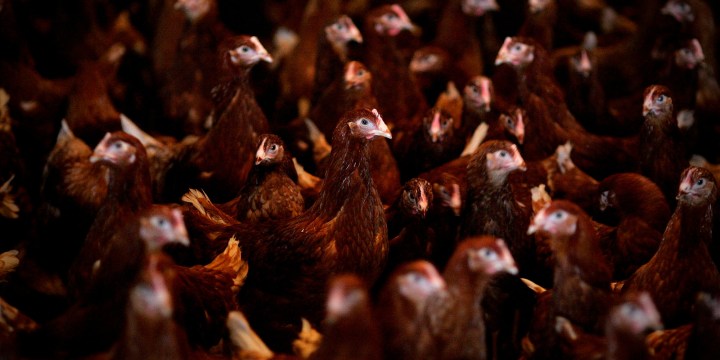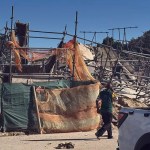COMPANIES
Astral celebrates ‘remarkable’ annual results despite government’s chickens coming home to roost

Despite power, water and other headwinds, Astral’s operating profit increased by 102.5% to R1.44-billion, the second-highest profit in the company’s history. But SA’s biggest poultry producer says the government’s failings are making it harder for businesses to be positive about the country.
Unprecedented rolling blackouts since January, “rapidly deteriorating water infrastructure” and the government’s failure in its duty to provide basic services to meet the needs of South Africa’s people make it difficult to remain upbeat about the country, Astral Foods chairperson Theuns Eloff notes in the company’s integrated report for the year ended 30 September 2022.
“Government has simply failed in its duty to provide basic utilities to meet the needs of its people. It is difficult to remain positive and it is widely acknowledged that drastic political change is needed,” he says.
The country’s biggest poultry producer railed against the state’s collapse, saying water interruptions and rolling blackout interruptions cost Astral R147-million in the past year, resulting in higher selling prices and lower chicken supply.
The 2022 financial year again proved to be “exceptionally challenging”, despite the easing of the Covid-19 lockdowns, which were finally lifted in mid-June this year. The outbreak of avian influenza, the war in Ukraine, which is increasing the import cost of raw materials such as maize and soya meal, and chicken dumping have placed severe strain on Astral’s operations.
In light of the pressures on operations, Astral’s results are “remarkable”, Eloff says. He notes the increase in the consumer food price inflation rate to 7.5%, which placed further strain on the public’s ability to buy food.
Eloff criticises the decision by Ebrahim Patel, the minister of trade, industry and competition, to suspend antidumping duties on chicken imports for the next 12 months to fight food inflation and its effects on the poor.
With “neither provisional nor permanent duties in place, this move puts South Africa’s second-largest agricultural industry at risk of anti-competitive behaviour”, Eloff says. The SA Poultry Association has said the negative effects can already be measured and could lead to high employment losses.
Commercial survival
Then there’s South Africa’s likely greylisting in February 2023 by the Financial Action Task Force over money laundering and State Capture risks, which are all weighing on the outlook for the coming financial year. Consumers are coming under greater pressure and raw materials and other costs such as electricity and fuel are likely to remain high.
“I am under no illusion that there is an easy or quick solution to these problems, but I do know that [the] government will have to address these issues as a matter of urgency to ensure the commercial survival of companies,” Eloff says.
“The group maintains a resilient balance sheet, a strong focus on cash management and this, together with a proven strategy of being the best low-cost producer of protein, will continue to ensure that Astral remains the leading poultry producer in South Africa.”
Feed makes up about 70% of the total cost to raise a broiler chicken to slaughtering stage. Broiler feed prices increased by 11.6% for the year under review (last year, it was 15.8%). Although broiler selling prices rose by 12.5% over the same period, it was not enough to recover the full impact of rising feed costs in conjunction with hikes in non-feed expenses — mostly fuel and energy — resulting in a negligible recovery increase in broiler margins to 3.5%.
Broiler sales volumes increased by 8.9% with an increase in broiler slaughter numbers of 400,000 birds to an average of 5.8 million birds a week (2021: 5.4 million birds a week).
Profits were thinned by extraordinary costs such as water and electricity supply interruptions (R147-million) and bird flu (R5-million). The water and rolling blackouts cost reflects a year-on-year increase of R116-million.
Total poultry imports into South Africa averaged 33,318 tonnes a month in this financial year, averaging just under 6 million birds a week or about 22% of local consumption.
Visit Daily Maverick’s home page for more news, analysis and investigations
Strong balance sheet
The year-on-year increase of 103% in the operating profit was driven by an increase in poultry sales volumes and higher poultry selling prices.
Astral CEO Chris Schutte says the group’s net operating margin is still below its long-term average.
“We are, however, pleased with the performance during the year under trying conditions. Cash flow generated from operations for the year of R1,492-million resulted in a strong balance sheet with net surplus cash on hand of R701-million.”
Higher input costs, largely driven by macroeconomic factors, are putting the business under pressure. Astral says it subsidised a large proportion of the broiler cost base during the second half of the financial year but as this was not a sustainable situation, it had to hike prices to ensure the long-term sustainability of the business.
Nevertheless, Astral has delivered a solid set of results, with revenue reported for the year ended 30 September 2022 at R19.3-billion, up 21.9% on the previous year.
Gross profit was up by 41.6% to R4-billion (R2.8-billion in 2021), with an increase in the gross profit margin from 17.9% to 20.8% due to increased volumes, production efficiencies and the recovery of increased feed costs through net poultry price sales.
Operating profit increased by 102.5% to R1.44 billion — the second-highest profit in the company’s history — with the operating margin improving from 4.5% to 7.4%.
Compared with the 15% achieved in the 2018 financial year, the operating margin this financial year was mainly due to the “extraordinary high” feed costs the group had to absorb.
Headline earnings increased by 124% to R1.06-billion (up from R473.7-million in 2021), which the group said were delivered in a very tough environment, in which water and power supply cost R116-million.
The group generated R405.9-million net cash inflows during the year, with a net surplus cash at the end of the year of R701-million (up from R277.7- million).
The company declared a final dividend of R5.90 per share. The total dividend for the year is R13.80 per share. BM/DM



















Comments - Please login in order to comment.